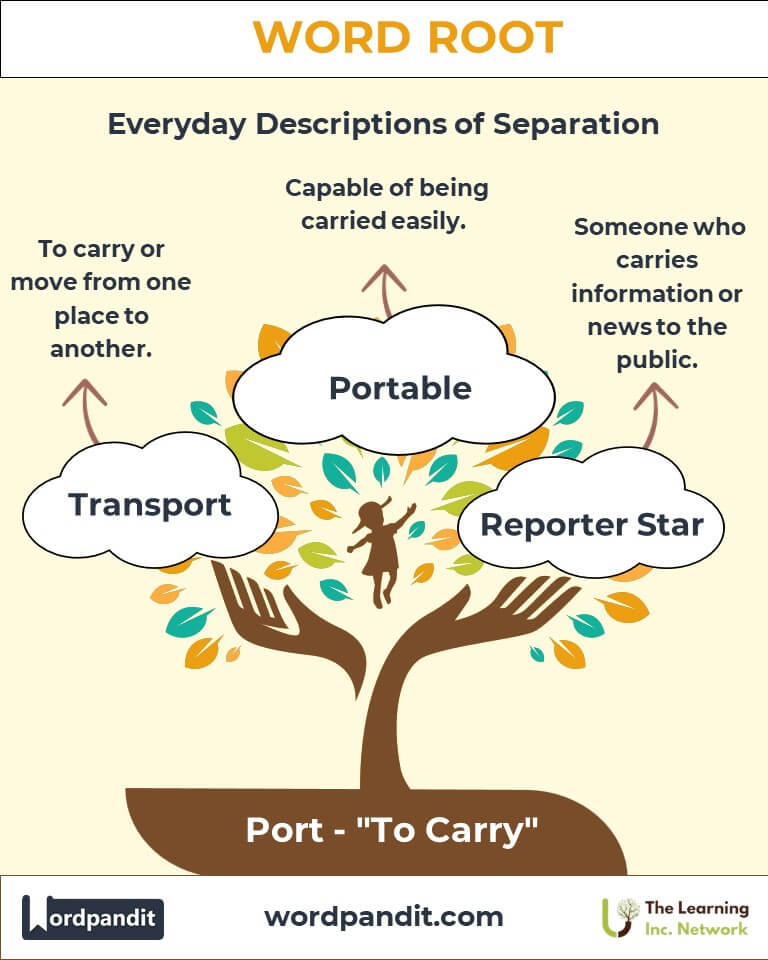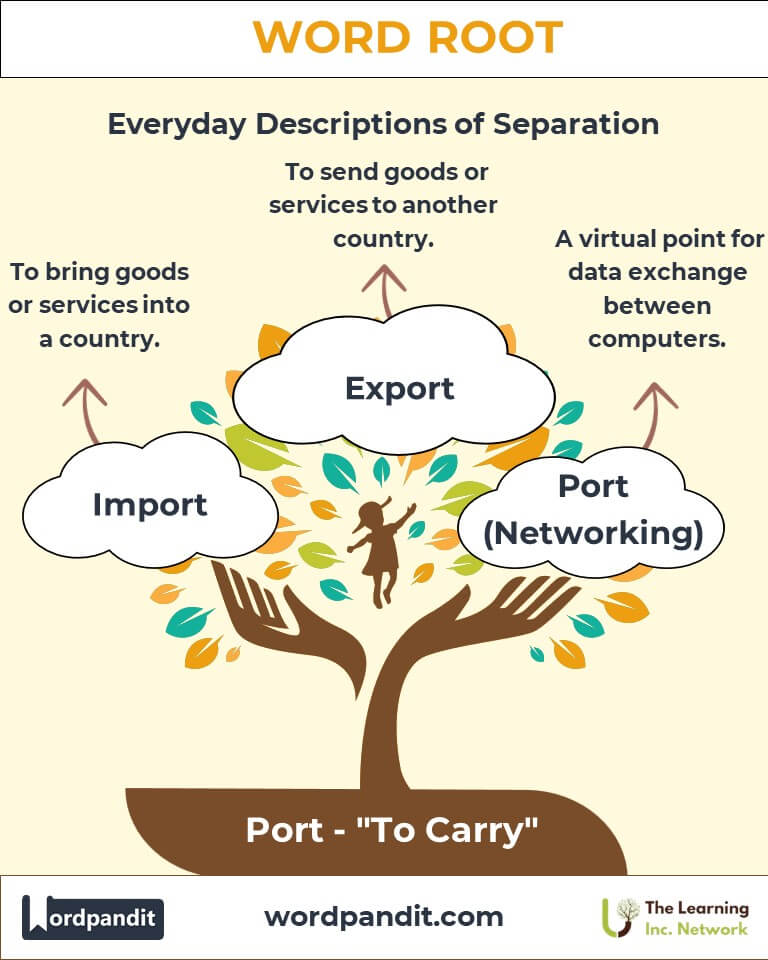Port: The Root of Carrying Connections Across Language and Meaning
Discover the profound utility of the root "Port," originating from Latin, meaning "to carry." From daily use in words like "transport" and "portable" to specialized terms in technology and trade, this root carries its weight across diverse vocabularies.

Table of Contents
- Introduction: The Essence of "Port"
- Etymology and Historical Journey
- Mnemonic: Unlocking the Power of "Port"
- Common "Port"-Related Terms
- "Port" Through Time
- "Port" in Specialized Fields
- Illustrative Story: "Pheno" in Action
- Cultural Significance of"Port"
- The "Port"" Family Tree
- FAQs About the "Port" Word Root
- Test Your Knowledge: "Port" Mastery Quiz
- 1Conclusion: The Living Legacy of"Port"
1. Introduction: The Essence of "Port"
Imagine carrying a heavy load or navigating through a bustling port city. The word root "Port", derived from the Latin portare, meaning "to carry," captures this essence of movement and conveyance. Found in everyday language and specialized fields alike, "Port" symbolizes connection, transport, and portability. From ancient trade routes to modern data transmission, this root continues to bear significance across time and disciplines.

2. Etymology and Historical Journey
The Latin root portare ("to carry") gave rise to words across Romance and Germanic languages. In medieval Europe, ports were hubs of activity, connecting cities and enabling trade. The term evolved into broader concepts, such as "transport" (carrying across) and "portable" (able to be carried). Over centuries, "Port" has adapted to include technological, physical, and abstract meanings.
3. Mnemonic: Unlocking the Power of "Port"
Picture a strong worker at a harbor, carrying goods onto a ship labeled "PORT." The cargo represents ideas, goods, and opportunities being transported.
Mnemonic Device: "Port carries the weight of goods, words, and ideas."
4. Common "Port"-Related Terms
- Transport (tran-sport): To carry or move from one place to another.
Example: "The goods were transported via a large cargo ship." - Portable (por-tuh-buhl): Capable of being carried easily.
Example: "Laptops are designed to be portable for users on the go." - Import (im-port): To bring goods or services into a country.
Example: "The nation imports electronics from overseas." - Export (eks-port): To send goods or services to another country.
Example: "The company exports wine to Europe." - Portfolio (por-tuh-foh-lee-oh): A case for carrying documents or artwork; also refers to a collection of work or investments.
Example: "She presented her design portfolio to the client." - Reporter (re-por-ter): Someone who carries information or news to the public.
Example: "The reporter covered the breaking news live from the scene."
5. "Port" Through Time
1. Portus (Latin): Initially referred to a harbor or gateway, emphasizing its role as a point of entry or exit.
2. Transport Revolution (18th-19th century): The Industrial Age expanded "Port" into innovations like transport vehicles, connecting distant regions.
3. Digital Age (20th-21st century): The term evolved further to describe data transfer "ports" in computers and devices, symbolizing virtual connectivity.
6. "Port" in Specialized Fields
- Technology: Port (Networking): A virtual point for data exchange between computers.
Example: "The firewall blocked certain network ports for security." - Medicine: Port (Medical Device): A small device implanted under the skin to facilitate medication delivery.
Example: "The port allowed easy administration of chemotherapy." - Business: Import/Export: Vital concepts in international trade.
Example: "Export taxes impact global commerce." - Transportation: Port Authority: Governs operations at major harbors.
Example: "The Port Authority manages shipping logistics."
Illustrative Story: "Port" in Action
Marina was an import-export manager working at a bustling seaport. One day, a shipment of goods destined for Europe was delayed due to miscommunication. Marina, using her trusty laptop (a portable tool), quickly accessed the port’s data system. By coordinating with the port authority and reporters on-site, she ensured the transport resumed smoothly. This pivotal moment showcased how "Port" facilitates connections in a modern, globalized world.
Cultural Significance of the "Port" Root
Ports have historically symbolized gateways to opportunity, exploration, and exchange. From ancient harbors fostering cultural interactions to modern airports connecting people worldwide, the "Port" root emphasizes humanity’s drive to connect, carry, and create. Literature and idioms, like "carrying the weight of the world," reflect the deep cultural resonance of this root.

The "Port" Family Tree
- Fer (Latin: to carry):
- Transfer: To move something from one place to another.
- Infer: To carry meaning or understanding.
- Miss/Mit (Latin: to send):
- Mission: An important assignment sent to achieve a goal.
- Transmit: To send across distances.
- Vey/Via (Latin: way, road):

FAQs About the "Port" Word Root
Q: What does the root "Port" mean, and where does it originate?
A: The root "Port" means "to carry" and originates from the Latin word "portare." It forms the foundation for words related to movement and transport, such as "transport" (to carry across) and "portable" (able to be carried).
Q: How does "Port" relate to technology?
A: In technology, "Port" is used to describe hardware or virtual points that facilitate data exchange. For instance, a USB port allows physical devices to connect, while a network port enables communication between computers over the internet.
Q: What is the difference between "Import" and "Export"?
A: "Import" refers to bringing goods into a country or system, while "Export" involves sending goods out for trade or use elsewhere. Both terms reflect the "carrying" essence of the root "Port" in commerce.
Q: What is meant by "Portable"?
A: "Portable" describes something that can be easily carried or moved. Examples include laptops and portable speakers, highlighting the convenience and mobility tied to the root "Port."
Q: How has "Port" evolved in the digital age?
A: In the digital realm, "Port" applies to concepts like data transfer and connectivity. Network ports act as virtual channels for data flow, maintaining the "carry" function in a modern context.
Test Your Knowledge: "Port" Word Root Quiz
1. What does the root "Port" signify?
2. Which term describes sending goods out of a country?
3. What is a portfolio used for?
4. What does a network port facilitate?
5. Which device exemplifies "Portable"?
12. Conclusion: The Living Legacy of "Port"
From ancient harbors to modern digital highways, the root "Port" has carried its significance through the ages. It connects the physical and abstract worlds, enabling transport, communication, and connection. As technology advances and globalization deepens, "Port" continues to symbolize humanity’s enduring quest to carry forward innovation, opportunity, and understanding.














